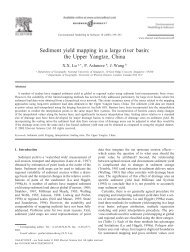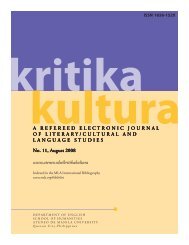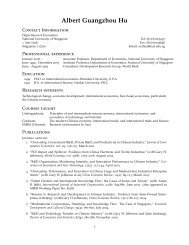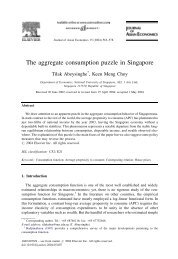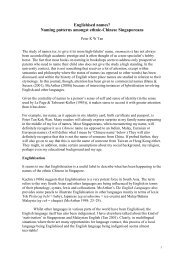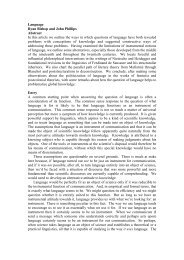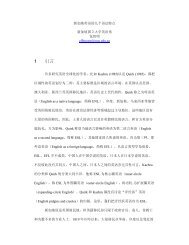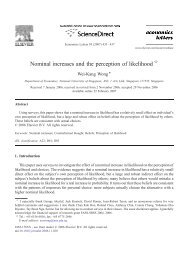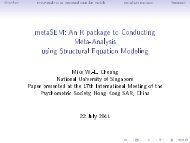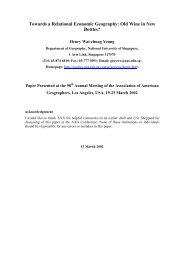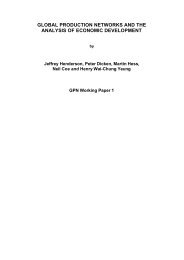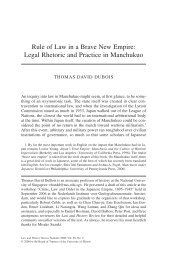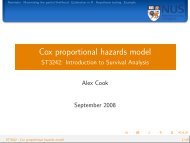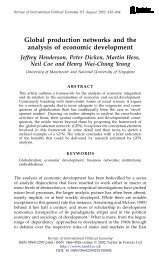Researching Hybridity in Social and Economic ... - NUS Home
Researching Hybridity in Social and Economic ... - NUS Home
Researching Hybridity in Social and Economic ... - NUS Home
Create successful ePaper yourself
Turn your PDF publications into a flip-book with our unique Google optimized e-Paper software.
impact on the very subjects of research themselves. A special report on Asian family<br />
succession by John Ridd<strong>in</strong>g, a Hong Kong-based correspondent of The F<strong>in</strong>ancial Times, on<br />
10 March 1998 quoted me, among other th<strong>in</strong>gs, as say<strong>in</strong>g, “Even if you have a good son, it is<br />
difficult for him to comm<strong>and</strong> the respect accorded to [the] founder <strong>and</strong> patriarch” <strong>and</strong>, “For<br />
many <strong>in</strong>ternational <strong>in</strong>vestors the lack of transparency is l<strong>in</strong>ked to family control <strong>and</strong><br />
succession” (p.15). Be<strong>in</strong>g quoted as a Ch<strong>in</strong>ese bus<strong>in</strong>ess expert <strong>in</strong> one of the world’s most<br />
famous bus<strong>in</strong>ess newspapers apparently opened many more doors for me. The Far Eastern<br />
<strong>Economic</strong> Review subsequently approached me for an exclusive <strong>in</strong>terview on “succession <strong>in</strong><br />
Ch<strong>in</strong>ese family bus<strong>in</strong>ess” that was also aired live on CNBC Live shortly after the FT report.<br />
This totally unexpected coverage of my views on Ch<strong>in</strong>ese family bus<strong>in</strong>ess by three<br />
highly <strong>in</strong>fluential media products (FT, FEER <strong>and</strong> CNBC) made me aware for the first time<br />
that academics could be an important actant, <strong>in</strong> the words of actor network theory, <strong>in</strong> shap<strong>in</strong>g<br />
the ways <strong>in</strong> which the bus<strong>in</strong>ess community operates. I was quite sure that the impact of my<br />
comments on the bus<strong>in</strong>ess community was further enhanced by the ongo<strong>in</strong>g <strong>and</strong> unruly<br />
accusation of “crony capitalism” <strong>in</strong> the wake of the Asian economic crisis. Such lead<strong>in</strong>g<br />
commentators of the Asian economic crisis <strong>in</strong> 1997/1998 as Paul Krugman <strong>and</strong> Alan<br />
Greespan had argued that the crisis resulted from the lack of transparency <strong>in</strong> the f<strong>in</strong>ancial<br />
systems of various Asian economies. In many East <strong>and</strong> Southeast Asian economies, the<br />
existence of strong patron-client relationships between the state <strong>and</strong> bus<strong>in</strong>ess people (mostly<br />
ethnic Ch<strong>in</strong>ese) was suggested as the primary cause of the Asian economic crisis. The deep<br />
cultural roots <strong>in</strong> Confucianism of this k<strong>in</strong>d of “crony capitalism” were revealed as someth<strong>in</strong>g<br />
highly negative <strong>and</strong> detrimental to the efficient operation of the market mechanism <strong>in</strong> East<br />
<strong>and</strong> Southeast Asia, culm<strong>in</strong>at<strong>in</strong>g <strong>in</strong> the economic crisis. My suggestion of the l<strong>in</strong>k between<br />
family control <strong>and</strong> the lack of transparency <strong>in</strong> Ch<strong>in</strong>ese family firms published <strong>in</strong> The<br />
F<strong>in</strong>ancial Times couldn’t be timelier! It must have been picked up by some high profile<br />
7



